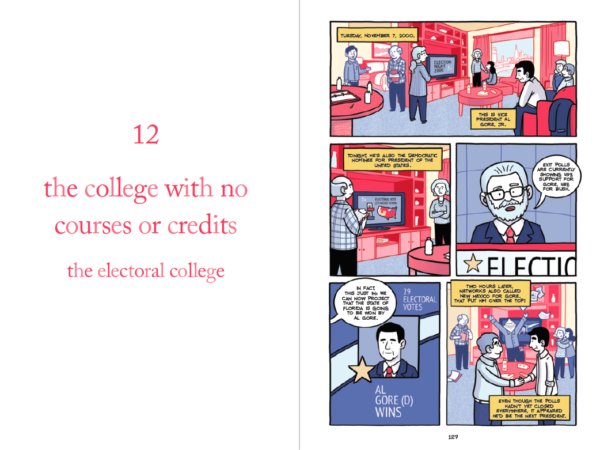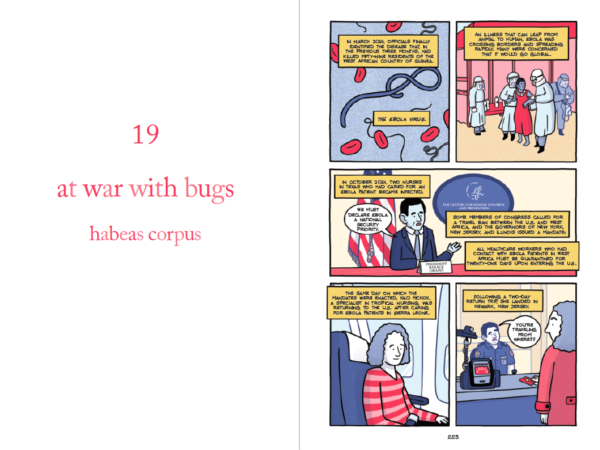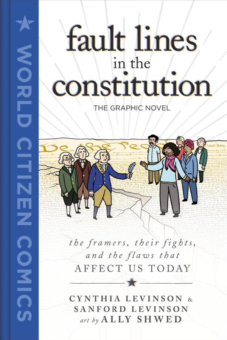Read Two–2!–Chapters of the Graphic Novel here!
These chapters are on the Electoral College and on pandemics. Talk about timely!
Watch a trailer for Macmillan’s World Citizens Comics series. Fault Lines: The Graphic Novel is the second book to be published.
A Discussion Guide is coming in 2021. Meantime, take a look at the Resources for Teachers for the text version of Fault Lines in the Constitution:
* Use this webinar video we made to show your students how the Constitution relates to current events. Or, hand them this article in the Washington Post.
* Peachtree’s Discussion Guide for the text version is packed with engaging questions, fun activities, and easy printables, including “I Am Constitutionally Literate” stickers!
*School Library Journal published terrific Teaching Ideas for social studies and humanities classrooms.
* Professor Robert Cohen and Stacie Brensilver Berman at New York University’s Steinhardt School prepared standards-based lesson plans with terrific resources and activities on the following topics:
- The Senate (Chapter 2)
- Gerrymandering (Chapter 5)
- Voting Rights (Chapter 8)
- The Electoral College (Chapter 12)
- Habeas Corpus (Chapter 19)
- Amending the Constitution (Chapter 20)
* Illinois Civics teachers developed super Support Materials.
Math teachers: You can find lesson plans, explanations, videos, graphics, and activities galore at “Investigating Gerrymandering and the Math Behind Partisan Maps.”
Blog
Be sure to subscribe to our Fault Lines in the Constitution blog, which updates the book every month. (That’s how timely it is!)
If you would like to work with your students on their blogging (i.e., short opinion essay) skills, take a look at “Finding Faults by Following the Dots,” a blog we posted for a contest we ran.
Games!
The National Archives and Records Administration Education Office has developed terrific games related to the Constitution. Two of them relate directly to Fault Lines in the Constitution.
The Amendment Process Board Game is like Chutes and Ladders. Here are the Instructions.
Can You Change the Constitution? shows older students how difficult the process is, just as we describe in Chapter 18. For this game, you’ll need four 20-sided die. Here are the Game Cards.
Interviews
Many public radio stations interviewed Sandy and me about Fault Lines in the Constitution. Here are links to conversations that are particularly informative:
- “Constitutional Fault Lines in Uncertain Times” with Mitch on KPFA, October 6, 2020
- “The Best of Our Knowledge–Constitutional Comics” with Bob Barrett on WAMC, Sept. 17, 2020
- “Fault Lines in the Constitution–The Graphic Novel” with Dan Skinner on Kansas Public Radio, September 2020
- “Fault Lines in the Constitution–The Graphic Novel” with Christopher Calloway, September 2020
- “Fault Lines in the Constitution–The Graphic Novel” with Shelley Irwin, WGVU/PBS/NPR, September 4, 2020
- “Exploring the Constitution’s Flaws” with Jonathan Capeheart on the Leonard Lopate Show, WNYC, October 16, 2017
- “The Imperfect Nature of the Constitution” with John Baxter on Jefferson Public Radio, August 30, 2017
- “Ideasphere” with Guy Rathbun on PRX, August 31, 2017
- “David Pakman Show” with David Pakman, July 2019
- “The Best of Our Knowledge” with Bob Barrett on WAMC, September 21, 2017
- “Nightside with Dan Rea,” on WBZ, September 26, 2017
- “Talk Nation Radio” with David Swanson, October 3, 2017
- “Rising Up” with Sonali, October 5, 2017
- “Conversations” with Dan Skinner on Kansas Public Radio, December 27, 2017
- “Rag Radio” with Thorne Dreyer on KOOP, July 19, 2019
Presentations
Watch us at the National Archives, the National Book Festival, and the Harvard Law School.
Websites
These websites are especially useful:
Bibliography
- Books on the Constitution by Sandy Levinson, my co-author, include Framed: America’s 51 Constitutions and the Crisis of Governance and Our Undemocratic Constitution: Where the Constitution Goes Wrong (And How We the People Can Correct It)
- For deep background and great stories on what happened at the Constitutional Convention in 1787, we recommend Plain, Honest Men: The Making of the American Constitution by Richard Beeman.
- Don’t forget to read the Constitution itself!



